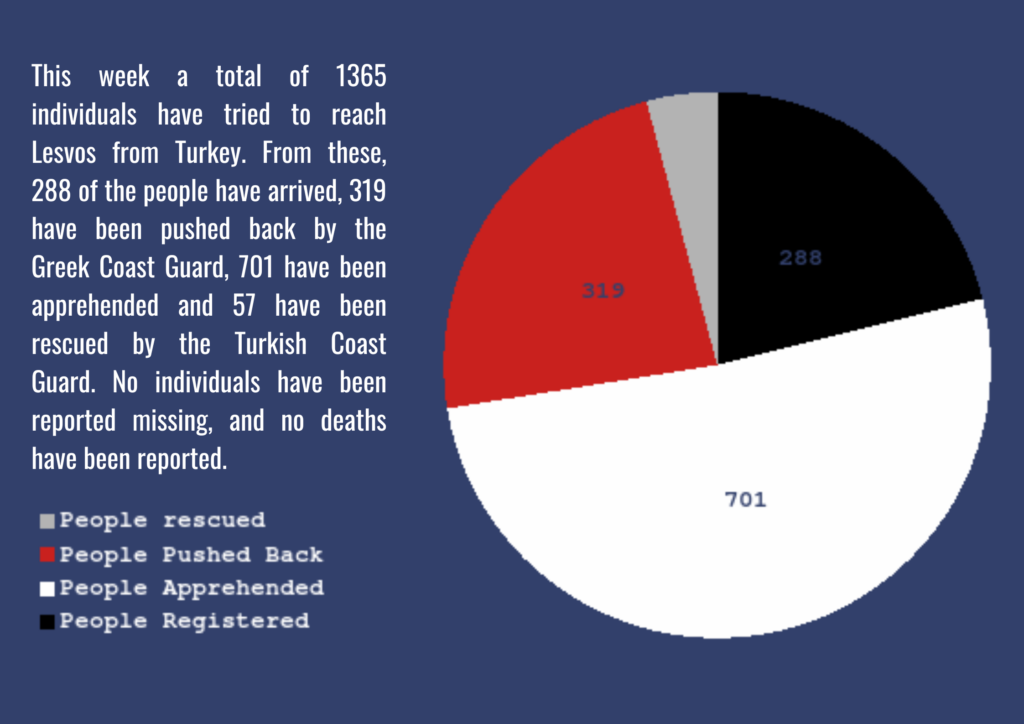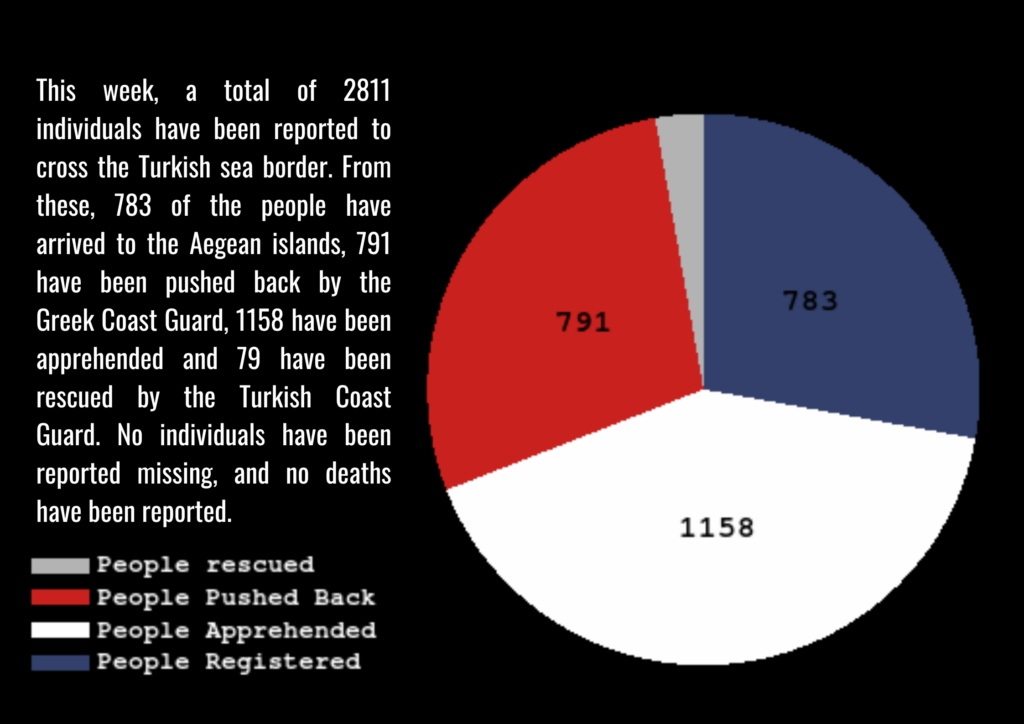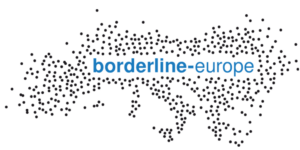 This study by borderline-europe examines the reality of anti-smuggling efforts in Greece, analysing the current legal framework as well as its practical enforcement. It shows that instead of protecting the rights of smuggled migrants and asylum seekers, these policies criminalise them and expose them to long prison sentences with the accusation of smuggling, all simply for having crossed the border by boat or car. This is made possible both by the legal framework set up in Greece and the EU, which is formulated very broadly, and further reinforced by an implementation that is characterised by gross rights violations such as arbitrary arrests, torture, abuse, coercion, and lack of access to legal support and interpretation. Individuals are typically arrested immediately upon arrival, held in pre-trial detention for months, and have very limited options to defend themselves and access support. The trials that tackle these accusations are very short and flout basic standards of fairness. Consequently, people convicted of smuggling form the second largest group by crime in Greek prisons, with almost 90% of them being third-country nationals. Given the gravity and extent to which criminalization and related human rights violations take place, there is an urgent need to address this issue.
This study by borderline-europe examines the reality of anti-smuggling efforts in Greece, analysing the current legal framework as well as its practical enforcement. It shows that instead of protecting the rights of smuggled migrants and asylum seekers, these policies criminalise them and expose them to long prison sentences with the accusation of smuggling, all simply for having crossed the border by boat or car. This is made possible both by the legal framework set up in Greece and the EU, which is formulated very broadly, and further reinforced by an implementation that is characterised by gross rights violations such as arbitrary arrests, torture, abuse, coercion, and lack of access to legal support and interpretation. Individuals are typically arrested immediately upon arrival, held in pre-trial detention for months, and have very limited options to defend themselves and access support. The trials that tackle these accusations are very short and flout basic standards of fairness. Consequently, people convicted of smuggling form the second largest group by crime in Greek prisons, with almost 90% of them being third-country nationals. Given the gravity and extent to which criminalization and related human rights violations take place, there is an urgent need to address this issue.
Author: borderviolencelesvos
Von Unten – Who profits from brutal and murderous Pushbacks?
For the occasion of World Refugee Day on 20 June, you can listen to a podcast with the cooperation of radio station Radio VC Mytilini on Lesvos. It’s about the brutal and murderous pushbacks at the EU’s external borders and who benefits financially from them. The people who carry out these pushbacks are paid for it, you can find out where the money comes from in this podcast. The podcast is in English.
Published by CBA on https://cba.fro.at/624115
These are not accidents, they’re murders
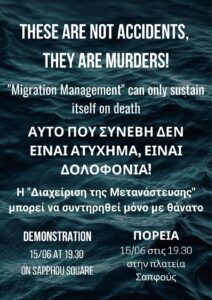 On 13 June 2023 around 2pm, 750 migrants called for help off the coast of Pylos. According to Alarm Phone by 5pm the Greek authorities, including Hellenic Coast Guard, FRONTEX and UNHCR, were alerted. A nearby merchant vessel was informed of the distressed ship, but stated it could only intervene under the authority of the Hellenic Coast Guard. Despite this, the merchant vessel provided water to the people in distress. Some time after midnight, the group called Alarm Phone for the last time.
On 13 June 2023 around 2pm, 750 migrants called for help off the coast of Pylos. According to Alarm Phone by 5pm the Greek authorities, including Hellenic Coast Guard, FRONTEX and UNHCR, were alerted. A nearby merchant vessel was informed of the distressed ship, but stated it could only intervene under the authority of the Hellenic Coast Guard. Despite this, the merchant vessel provided water to the people in distress. Some time after midnight, the group called Alarm Phone for the last time.
Statement on Pylos to the Hellenic Coastguard
 Yesterday through the active neglect of Greek and European authorities at least 79 people died and hundreds more are missing, very likely dead. Later that day the Hellenic Coastguard tried to wash their hands by making a statement that assistance was refused by the people on the boat.
Yesterday through the active neglect of Greek and European authorities at least 79 people died and hundreds more are missing, very likely dead. Later that day the Hellenic Coastguard tried to wash their hands by making a statement that assistance was refused by the people on the boat.
We could imagine why people would refuse your help, but that simply does not matter at all. A boat in distress, highly overcrowded, without a driver was in the middle of the sea. You knew it for hours and did nothing. You are the Coast Guard. This is supposed to be your job.
Continue reading Statement on Pylos to the Hellenic Coastguard
XX/05/2023 – What is happening today in the refugee structures on the Aegean islands: Serious problems in the EU-funded structures
 Report of Refugee Support Aegean and Pro Asyl on how seven years after signing the toxic EU-Turkey “agreement”, the East Aegean islands remain “black holes” for the fundamental rights of applicants for international protection. According to recent data, arrivals had increased significantly in late 2022 and early 2023. At the same time, allegations of deterrence practices and informal forced returns (pushbacks) at maritime borders continue. In the Closed Controlled Access Centres (CCAC) in Samos, Kos and Leros – the construction of which was 100% financed by the European Union – as well as in those in Lesvos and Chios, asylum seekers and their children live in remote areas with disproportionate security and surveillance measures, facing reported violent behaviour by security authorities and with significant shortcomings in legal assistance, medical care and interpretation. Shortcomings can be observed even in basic necessities due to delays in competitions, the withdrawal of NGOs, but also due to delays in the provision of the monthly financial assistance allowances provided for asylum seekers.
Report of Refugee Support Aegean and Pro Asyl on how seven years after signing the toxic EU-Turkey “agreement”, the East Aegean islands remain “black holes” for the fundamental rights of applicants for international protection. According to recent data, arrivals had increased significantly in late 2022 and early 2023. At the same time, allegations of deterrence practices and informal forced returns (pushbacks) at maritime borders continue. In the Closed Controlled Access Centres (CCAC) in Samos, Kos and Leros – the construction of which was 100% financed by the European Union – as well as in those in Lesvos and Chios, asylum seekers and their children live in remote areas with disproportionate security and surveillance measures, facing reported violent behaviour by security authorities and with significant shortcomings in legal assistance, medical care and interpretation. Shortcomings can be observed even in basic necessities due to delays in competitions, the withdrawal of NGOs, but also due to delays in the provision of the monthly financial assistance allowances provided for asylum seekers.
How Lesvos learned to love the pushbacks
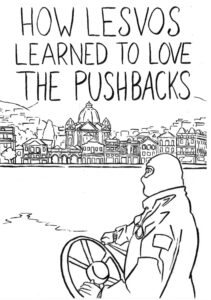 The text “How Lesvos learned to love the pushbacks” was published in Mytilene in May 2023. It was printed in both Greek and English and is available free of charge. Its use is free for non-commercial purposes.
The text “How Lesvos learned to love the pushbacks” was published in Mytilene in May 2023. It was printed in both Greek and English and is available free of charge. Its use is free for non-commercial purposes.
Get the English PDF!
Get the Greek PDF!
30/03/2023 – Systemic deficiencies in the access of beneficiaries of international protection to documents and socio-economic rights
Radio VC Mytilene – Children in the Camp
In this episode our guest , who is a teacher inside the camp talks about different perspectives on children’s life in the camp, the educational system, living conditions for children, their mental health and so on.
https://open.spotify.com/episode/4rxJClf1j68bBaz1lztlq3?si=mOx31gasTqO61aR-fGKdPg
Update week 52
AGAINST PUSHBACKS: notes from Lesvos
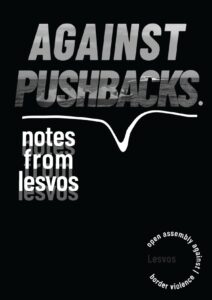
The brochure “AGAINST PUSHBACKS: notes from Lesvos” was published in Mytilene. It was printed in both Greek and English in 200 copies and is available free of charge. Its use is free for non-commercial purposes.
Get the English PDF!
Get the Greek PDF!
Get the French PDF!

